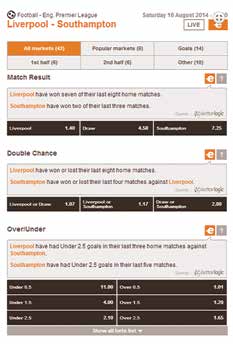From the traditional betting habits of Europe to the expanses of Asia, data analytics firm BettorLogic is showing how the correct use of data can provide benefits to sportsbook operators and customers alike.
One of the enormous challenges facing sportsbook operators today is standing out from the crowd. It’s a problem that is particularly confronting in Asia, where the sheer volume of options available to customers – both legal and illegal – make for a saturated market.
Yet for Andrew Dagnall, CEO of data analytics firm BettorLogic, the solution isn’t as elusive as it seems.

“We are driven by an inherent belief that the actual betting experience for the bettor is not what it should be,” he explains.
Dagnall’s simple but salient observation came from his own experience as a bettor, where his interest in spread betting was stifled by a lack of readily available information to aid his bet selections.
“I thought it would be very useful to know what one should consider when making a bet,” he continues. “I mean, with horse racing all you needed to do was pick up one of the trade papers and that would give you the form you required to study a horse race, but if you wanted to bet on something like the US Masters, what were the important considerations? Was it important that someone had finished in the top 10 at the Masters before or had won a PGA Tour event?
“That was the idea I had to begin with – to focus on B2C, which was perhaps slightly naïve. We weren’t a tipping service, we just said ‘Here is the information as it relates to the betting market’.”
As it turned out, there wasn’t a lot of money in B2C, but BettorLogic’s product did appeal to sportsbooks and their eternal quest to stand out from that crowd. And so, from humble beginnings, the company developed its range of data analytics products – easibet, livelogic, multibet and nextbet – which essentially provide bettors with statistical reasons to bet delivered directly through their sportsbook both before and during sporting events.
“An example would be a Spanish La Liga game where it’s 1-0 to Real Madrid after 60 minutes and we might send out a prompt saying there will be at least two more goals scored in the match based on the historic statistical evidence,” Dagnall explains.
“Just as importantly we take into account the history of the bettor in terms of how and when they like to bet. Sportsbooks have so much data on their customers, they know exactly what they like to do, they know what type of bets they like to place, what events and with a bit more intelligence they would know how they react when doing well and how they react when doing badly. To that extent, we use the sportsbook’s data to create a profile of the player and it identifies exactly what their preferences are.”
The idea is to create a more personalized sportsbook experience for each individual user whereby they are directed straight to pages reflecting their personal betting preferences and provided with prompts known to appeal to them.
But it also provides an opportunity to cross international borders, with Bettorlogic’s analysis having found a number of fascinating differences between bettors in Asia and those in other parts of the world.
“From the data we’ve had from our Asian clients, we’ve certainly seen that the timeframe when someone is betting quite often follows patterns and we would attribute that to their lifestyle or their work style,” Dagnall says.

“We have noticed the fact that pre-event the parlays and the mixed parlays are very popular. And for the in-play Asian bettor the principal difference to the European or UK bettor is they will be much more active in a single event, whether it’s hedging what they’ve bet on or increasing their market position in a particular event. We’ve even noticed that quite often it is completely natural to see eight to 10 in-play bets on a single game whereas in the UK that tends to be restricted to one or two.
“Obviously the main driver in Asia is football although there is less of a concentration on a particular league compared to, say, Africa which is very much EPL (English Premier League) focussed.
“There is also much more focus on what football is being played today. Asian users are not particularly interested in what football is taking place tomorrow or in two days’ time, so as a consequence something like the Europa League tends to be quite popular because it is played on a Thursday and there is very little other football played on Thursdays.
“Finally, in Asia the markets are much more concentrated. Asia is still about 1×2, the Asian handicap or the goals handicaps. In the UK you tend to get a lot of the ‘both teams to score’ bet whereas Asia is more about ‘next team to score’.”
Despite identifying such clear trends in the region, Dagnall says that Asian-based operators haven’t yet, for the most part, made the most of the huge amounts of data available in the digital era.
“The main handicap in Asia is them actually getting the data and getting the data in a state whereby they can actually use it,” he explains. “For example, we look at about 15 bits of data related to a bet. I would say that from the Asian operators we have got data from, it has taken them considerably longer to get the data into what I would call a fit form.
“That might be an indication that perhaps they are not really looking at the data themselves, that their focus is much more on running the operation and expanding their customer base.”
Ultimately that means lost opportunities for operators and huge opportunity for companies like BettorLogic. After all, most bettors won’t hesitate to place a bet if given a compelling reason to do so.
“I think that invariably the typical bettor is always looking for a reason to have a bet,” Dagnall offers. “That’s what we do. If you take in-play betting as an example, we know before the game starts all the possible match situations which means the operator can set up push notifications for when those match situation occur. That can be very compelling from the point of view of the bettor because they feel like there is an instant decision to be made.
“In our experience, if you provide that reason they are far more inclined to say ‘Yes I will’ than ‘No I won’t’.”

























